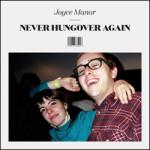
Joyce Manor Never Hungover Again
(Epitaph)
Even if you find yourself loving Joyce Manor, there’s a chance you’d feel a slight bit of embarrassment when listening to their music for the first time (and maybe even on subsequent listens). You’d probably sit there – a full grown adult no less – thinking to yourself, “What the hell? I stopped taking music like this seriously years ago, and here I am surrendering myself to this band’s flurry of pop punk hooks like a kid who spends his time longboarding around the mall.” Well, aside from the fact that this person probably takes himself WAAAY too seriously, it’s not so strange to find a lot to love about Joyce Manor even if most pop punk makes you cringe, as their bracing, stripped down immediacy, unkempt sound, and emotionally relatable-yet-ambiguous lyricism make them less Warped Tour and more 90’s post-hardcore/emo – not so Blink-182 as they are Archers of Loaf. And seeing as how they’ve been underground rock’s best-kept secret for the past four years, the odds of them popping up on your little sister’s iTunes seems unlikely.
But if any of their releases did have the potential to earn them such a fanbase, their latest, Never Hungover Again, would have the best chance. Though far from a blatant attempt to attract the populous masses and get their music in car commercials, Never Hungover Again is certainly a more well-groomed album than anything they’ve done before, even if the band's core attributes remain largely unchanged. Rather than changing anything in particular, the band’s latest seems to focus more on the friendlier aspects of their already established sound: guitars constantly sound off with immediate hooks, but they lean more heavily on the sweet, jangly side now, and vocalist Barry Johnson rarely lets his melodic, longing vocals dip into the unhinged territory it often used to reside in, especially on their excellent debut self-titled full-length.
Overall, Johnson’s more reserved vocal approach might be the most disappointing aspect of Never Hungover Again for fans of the group’s previous works and likely the biggest turn-off for those new to the group, especially those who don’t normally go for the often-melodramatic vocal stylings associated with pop-punk and emo. But even though it does occasionally dip into overly-saccharine territory – like in the largely plodding End of the Summer – it more often makes for a good match with the band's more heavily melodic – though still energetic – approach. Tracks like The Jerk and Falling in Love Again are as fast-paced and infectious as anything they’ve done before, but their greater reliance on jangly melodies rather than straight power chords adds a greater emotional resonance while hardly hampering on the fun. And if you’re still looking for something more closely resembling their harsher early material, looks no further than late-album tracks like In the Army Now or the bracing, fang-toothed Catalina Fight Song, which barely stays for over a minute but might be one of the album’s most memorable moments.
One aspect of Joyce Manor that has stayed completely consistent, thankfully, is the band’s lyrics. There are certainly a number of artists who do a better job of owning self-deprecation in their lyrics, but I’ve always appreciated Joyce Manor’s approach as opposed to many of their peers, as they often feel both direct and indirect at the same time. Pinpointing exactly what any one of their songs is about can often be tricky, but the figurative characters that inhabit their lyrics all seem to have some sort of burdening rain cloud constantly hovering above them or are stuck in some unfortunate situation, even if all the details are never fully given. It’s less “woe is me” and more “woe is everyone I know and it’s getting to the point where it’s bringing me down, too.”
This sentiment is all over Never Hungover Again – one guy doesn’t understand how you can be happy when you wear all black, another wears a paper bag-like mask and has to be his own dad, and another has accepted that you can’t keep in touch with everyone you’ve cared about, and even if you could, they probably don’t even think too much about it, anyway. Sure, most of these seem like nondescript feelings or situations that would otherwise fit into a more detailed stream of events, but they do aim to cast everything in notso much pure misery but a very real and relatable sense of defeated melancholy we probably all experience on a daily basis. It makes the album’s title seem less like a partying mantra but instead the kind of empty promises we all make now and again to break free from our repeated mistakes and failures, only to find ourselves buried in the same low the next weekend.
1 August, 2014 - 04:57 — Peter Quinton